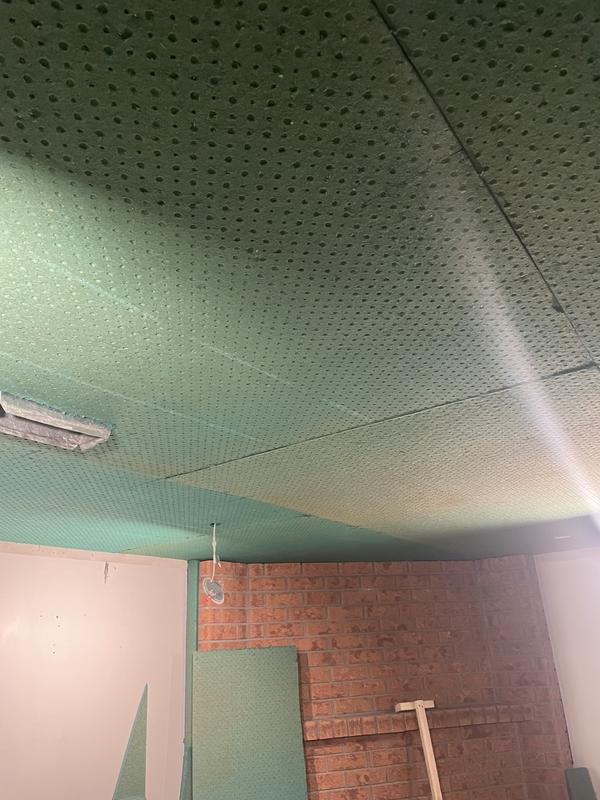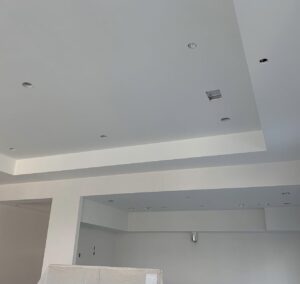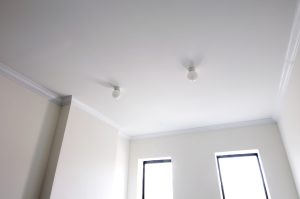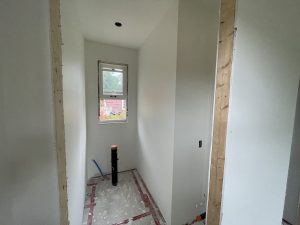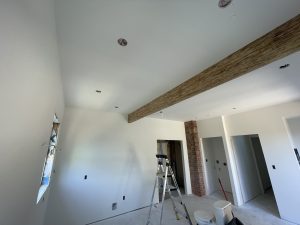Soundproofing Basement Suites: Enhancing Privacy and Comfort
Introduction
Basement suites are becoming increasingly popular, whether for rental income, multi-generational living, or additional living space. However, sound transfer between floors can be a major issue, leading to disturbances for both the occupants of the suite and those in the main home. The key to creating a comfortable and private living space is effective soundproofing with professional drywall techniques.
In this guide, we’ll explore the best soundproofing solutions for basement suites, including high-performance drywall, insulation, and construction methods to minimize noise and enhance privacy.
Understanding Soundproofing for Basement Suites
Before diving into specific solutions, it’s important to understand how sound travels in a home. Noise can pass through walls, ceilings, and floors in two main ways:
- Airborne Sound: This includes voices, music, and TV noise that travel through the air and can seep through gaps in drywall or doors.
- Impact Sound: This results from footsteps, furniture movement, or vibrations traveling through structural elements like floors and walls.
To create a truly soundproof basement suite, both types of noise need to be addressed with proper drywall installation, insulation, and additional soundproofing materials.
Best Soundproofing Drywall Techniques for Basement Suites
1. Installing High-Density Soundproof Drywall
Traditional drywall does little to block noise transfer. Instead, opt for soundproof drywall like:
- QuietRock®: A high-performance drywall designed to dampen sound.
- CertainTeed SilentFX®: A dense drywall panel that reduces sound transmission.
- Double-layer drywall with Green Glue: This method involves applying two layers of drywall with Green Glue, a viscoelastic compound that absorbs sound waves.
Thicker and denser drywall provides better sound absorption.
2. Using Soundproof Insulation Between Walls and Ceilings
Proper insulation is critical for blocking airborne noise. The best options for basement suites include:
- Roxul Safe’n’Sound® (Rockwool Insulation): A mineral wool insulation that provides superior soundproofing and fire resistance.
- Fiberglass Insulation: A more affordable alternative, though not as effective as Rockwool.
- Sonopan Panels: An advanced acoustic panel that enhances soundproofing when placed behind drywall.
Insulation should fill the entire wall cavity to eliminate gaps where sound can travel.
3. Decoupling Walls and Ceilings to Stop Sound Vibrations
Decoupling is the process of separating drywall from the framing structure to prevent vibrations from passing through. This can be done by:
- Using Resilient Channels: Metal channels attached to the wall or ceiling that separate drywall from studs.
- Installing Sound Isolation Clips and Hat Channels: This combination further reduces vibration transmission, making it ideal for basement ceilings.
Decoupling prevents impact noise from upstairs from traveling through the ceiling to the basement suite.
4. Sealing Air Gaps and Using Acoustic Caulking
Even small gaps around doors, windows, and outlets can allow sound to leak through. To prevent this:
- Use acoustic caulking around drywall seams, electrical boxes, and vents.
- Install solid-core doors instead of hollow ones, which do little to block sound.
- Weatherstrip doors and windows to eliminate noise leaks.
Adding an automatic door bottom or sweep can help seal gaps under doors.
Additional Soundproofing Enhancements for Maximum Privacy
5. Upgrading Flooring to Reduce Footstep Noise
Impact noise from footsteps and furniture moving upstairs can be disruptive in a basement suite. The best solutions include:
- Acoustic Underlayment: Placing soundproofing materials under the flooring upstairs, such as cork, rubber, or foam mats.
- Floating Floors: A decoupled flooring system that absorbs impact vibrations.
- Carpet and Area Rugs: Soft materials help dampen noise, especially when used with thick underpadding.
6. Adding Soundproofing to Windows and Vents
- Soundproof curtains or double-glazed windows can block external noise.
- Acoustic baffles on vents prevent sound from traveling between rooms.
Why Professional Drywall Installation Matters
While DIY soundproofing solutions exist, professional drywall installation ensures maximum noise reduction. A professional drywall company, like Finest Finish, understands the best materials, techniques, and construction methods to create a truly soundproof basement suite.
Benefits of hiring professionals:
- Proper installation of high-performance drywall
- Expert use of Green Glue and soundproofing insulation
- Precision in sealing gaps and decoupling walls
- Compliance with local building codes for rental suites
Final Thoughts: Investing in Soundproofing for a Better Basement Suite
A well-soundproofed basement suite offers superior comfort, privacy, and increased property value. Whether you’re creating a rental suite or a private living space, professional drywall soundproofing is an investment that pays off in reduced noise disturbances and happier occupants.
Looking to soundproof your basement suite in Victoria? Contact Finest Finish for expert drywall installation and soundproofing solutions.

